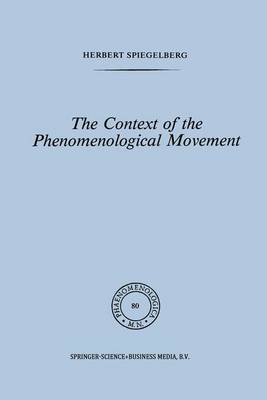Phaenomenologica
2 primary works
Book 63
Substantial encouragement for this volume came from the editors and readers of the Studies for Phenomenological and Existential Philosophy (SPEP) at Northwestern University Press. But its publi cation has been made possible only by the unqualified and un abridged acceptance of the Editorial Board of Phaenomen%gica, which at the time was still headed by its founder, the late Professor H. L. Van Breda, who welcomed the manuscript most generously. This makes his untimely passing even more grievous to me. The stylistic copy editing and proof reading were handled ef ficiently by Ruth Nichols Jackson, secretary of the Philosophy Department. In the proof reading I also had the able help of my colleague Stanley Paulson. I dedicate this book to the memory of my late brother, Dr. chern. Erwin Spiegelberg, at the time of his death assistant professor at the University of Rio de Janeiro, who preceded me by two years in emigrating from Nazi Germany. When in 1938 he put an end to his life in an apparent depression, he also did so in order not to become a burden to his brothers, who were on the point of following him. Whatever I, more privileged in health and in opportunities in the country of my adoption, have been able to do and achieve since then has been done with a sense of a debt to him and of trying to live and work for him too.
Book 80
This is an unashamed collection of studies grown, but not planned before hand, whose belated unity sterns from an unconscious pattern ofwhich I was not aware at the time ofwriting. I call it "unashamed" not only because I have made no effort to patch up this collection by completely new pieces, but also because there seems to me nothing shamefully wrong about following up some loose ends left dangling from my main study of the Phenomenological Movement which I had to cut off from the body of my account in order to preserve its unity and proportion. This disc1aimer does not mean that there is no connection among the pieces he re assembled. They belong together, while not requiring consecutive reading, as attempts to establish common ground 1lnd lines of communication between the Phenomenological Movement and related enterprises in philo sophy. They are not put together arbitrarily, but because ofintrinsic affinities to phenomenology. This does not mean an attempt to blur its edges. But since they are growing edges, any boundaries cannot be drawn sharply without interfering with the phenomena. Nevertheless, in the end the figure of the Phenomenological Movement should stand out more distinctIy as the text against its surrounding context, ofwhich these studies are to provide some ofthe comparative and historical background. This is why I gave to this collection the titIe "The Context ofthe Phenomenological Movement" in contrast to the central "text" as contained in my historical introduction to this movement.

